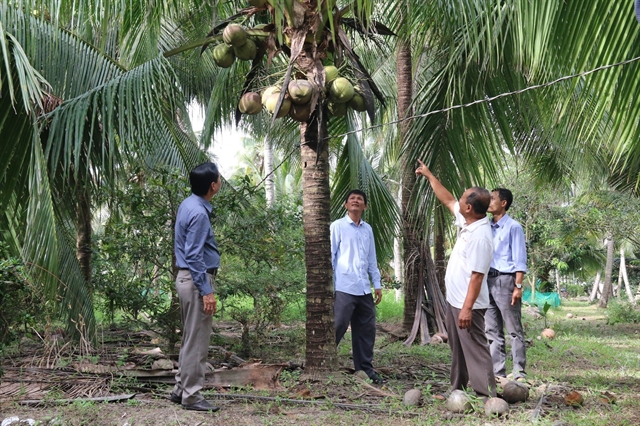 Society
Society

 |
| An organic coconut grove in Chợ Gạo District’s Bình Ninh Commune in Tiền Giang Province.– VNA/VNS Photo Minh Trí |
TIỀN GIANG – Tiền Giang Province is expanding growing organic coconut to increase value and meet export requirements.
The Cửu Long (Mekong) Delta province has about 22,000ha growing various varieties of coconut for harvesting young and old nuts, according to its Department of Agriculture and Rural Development.
The province’s coconut growing area has had a growth rate of 4.5 per cent a year since 2015.
Coconut has the second largest growing area, after only rice, in the province.
Coconut farmers earn an average profit of VNĐ91.2 million (US$3,700) per hectare a year for coconut trees that bear fruit stably.
In the province, coconuts are planted mostly in Chợ Gạo, Châu Thành, Tân Phú Đông and Gò Công Tây districts.
Chợ Gạo alone has nearly 7,700ha, and is the province’s largest coconut growing area.
According to Nguyễn Hồng Hữu, secretary of the Chợ Gạo District Party Committee, the district is zoned to develop coconut cultivation on a large scale and to switch from traditional growing methods to organic ones.
It targets to have 4,000ha of coconut planted under organic methods and have linkages with export processing companies by 2025.
It has zoned specialised coconut growing areas and provided growing techniques for farmers to increase yield, quality, output and income.
It has developed coconut cultivation in combination with developing linkages among stakeholders to develop value chains.
It will develop production codes and brand names for organic coconuts and promote sustainable coconut development.
It has set up a management board for its coconut development plan through 2025.
To develop organic coconut growing areas, the district’s co-operatives have played an important role in developing linkages among farmers and processing companies, and have promoted their role of organising coconut cultivation under organic methods.
Phạm Thanh Tuấn, director of the Bình Ninh Commune Agriculture Co-operative in Chợ Gạo, said the co-operative had promoted its role by gathering farmers to develop specialised organic coconut growing areas.
The co-operative has 111 members who grow a total of 120ha of coconuts.
Of these members, 24 grow a combined 16ha of organic coconut under a linkage with the Thabico Tiền Giang Food Industry Joint Stock Company.
Cao Tấn Hưởng, deputy chairman of the Chợ Gạo District People’s Committee, said the district has co-operated with the company to instruct farmers on growing stages for 300 ha of organic coconut in major coconut growing communes of Hoà Định, Xuân Đông and Bình Ninh.
The company has built a factory in Bình Ninh to manufacture fruit and coconut products and has a capacity of processing 300,000 coconuts a day.
The Chợ Gạo District Agriculture Services Centre, in cooperation with local communes, organised 85 training courses to provide organic coconut growing techniques for farmers in specialised coconut growing areas last year.
Farmers in the province have grown organic young coconuts for drinking juice and earned high incomes.
Lâm Bá Hiểu is growing Xiêm coconut, a type of coconut grown for drinking juice, under an organic farming method in Gò Công Tây District’s Thạnh Nhựt Commune.
He has switched to organic farming methods after getting information from his local farmers association about the benefits of growing organic coconut and the market’s high demand.
He was instructed on organic growing methods for tending the tree, treating pests and using organic fertiliser, he said.
The cultivation of young coconut for drinking juice offers high economic efficiency and requires less tending, according to the Gò Công Tây District Farmers Association.
The output of young coconut for drinking juice accounts for 60 per cent of the province’s total coconut output and farmers grow various varieties.
The province has 141 establishments and three processing companies which buy young coconuts for drinking juice and old coconuts for pulp to export to many markets, including Germany, New Zealand and Australia.
The province exports 1.2-1.4 tonnes of coconut pulp a year.
It is implementing various models and projects to develop coconut growing areas which apply high quality farming standards such as global and Vietnamese good agricultural practices (GlobalGAP and VietGAP) and organic standards.
Its project of growing coconut under organic methods in combination with guaranteed outlets to serve domestic and export markets is being implemented on 152.8ha of 430 households. – VNS




